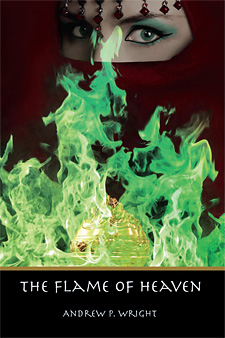Andrew Wright has set himself a noble goal as a Christian author: write a Bible-based novel that will lead non-Christians on to spiritual truth. His success will depend on how much of the work they perceive as fact, and how much as fiction.
The Flame of Heaven has a fast-paced plot loosely based on one of the Biblical stories surrounding the prophet Elijah. At the prophet's request, God pours down fire on his altar on Mount Carmel, demonstrating that He alone is the one true God. Wright's story picks up with Jezebel and one of the prophets of Baal secretly obtaining some of the "fire' God pours down and using it to create an occult weapon of immense power. The novel then switches between the past and the present, following the footsteps of the evil prophet, and the modern day baddies who seek to profit from the arcane artifact.
 The novel makes for great juvenile fiction, with rich descriptions and creative substitutions for the blanks left by history. The unbalanced villains have wildly seesawing moods and are as evil as anything you would find in a James Bond setting. The action scenes are engaging and likely to stretch the imagination as much as any airport novel.
The novel makes for great juvenile fiction, with rich descriptions and creative substitutions for the blanks left by history. The unbalanced villains have wildly seesawing moods and are as evil as anything you would find in a James Bond setting. The action scenes are engaging and likely to stretch the imagination as much as any airport novel.
The Christian content mainly comes courtesy of the servants of a secret society called Cele Dei (Latin for "Heavenly God'). These heavenly agents have been secretly observing Baal's more modern servants down through the ages. They are clearly people of faith who have a strong sense of God's providence in even the most disastrous situations. Their belief finds support in the frequent appearance of angels who advise, offer cryptic directions and even assist in aspects of their mission.
Wright takes a similar approach to Frank Peretti's This Present Darkness in describing the abilities and limitations of his Heavenly beings. Their battles with demonic forces seem finely balanced, with earthly pressures like time and the acquiescence of human will making all the difference. In one instance an angel's rescue mission is foiled by a man's failure to believe:
"[This evil one] cannot harm you if you place your trust in Christ," said the crystal voice in his head "
Dekker hesitated, his legs shaking beneath him.
"Go now," said the voice calmly, "I will try to protect you."
The human response is also integral to matters of spiritual salvation:
Marook looked up at the strange man he knew only as Shelomo.
"My friend " this night has taught me that there truly is a great God, a God above all gods as you have said to me many times " and that he is a God who can be trusted, who looks with compassion upon men. This night I pledge to your God my life and the life of my sons. We are now your servants."
Shelomo smiled, tears brimming in his eyes.
"My God has heard and accepts you, because of your great faith."
It's a different approach to other Christian fiction writers like CS Lewis who portray God's will as irresistible. When Aslan turns up in Narnia for instance, it always signals the end of the battle.
Wright hopes that Christians will consider giving The Flame of Heaven to their non-Christian friends to spark conversations about eternal matters. The fact that it is the first volume in a series may complicate this. However, I suggest that if Christians do, they ensure they buy two copies and read through the book with them. The Flame of Heaven is, after all, a creative work and the good friend will want to ensure that inquirers are aware, where spiritual matters are concerned, when fact turns to fiction.
























